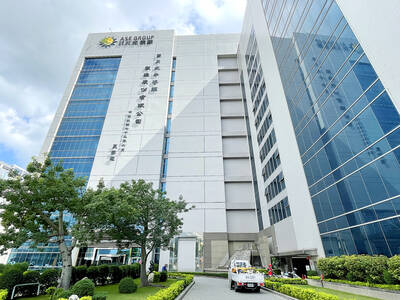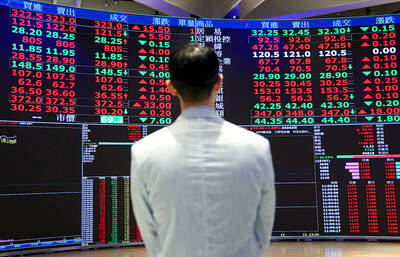Minister of Finance Lee Sush-der (李述德) yesterday defended the assorted tax cuts introduced by the government in the past year, saying most tax losses would be offset by the termination of tax preferences for high-tech firms later this year.
Lee made the comment after being asked by lawmakers to clarify the matter after the Ministry of Audit demanded similar information in a letter the previous day.
This was the first time the auditing authority posted such a request, Chinese Nationalist Party (KMT) Legislator Lin Teh-fu (林德福) said.
Lee dismissed concerns over a thinning national treasury, saying funding for the tax cuts would come mostly from the expiration of the Statute for Upgrading Industries (促進產業升級條例) at the end of this year.
Once the law expires, the government is expected to collect an extra NT$140 billion (US$4.26 billion) in tax revenues annually, a sum that would help make up for the tax losses resulting from new tax cuts, the minister said.
The government has lowered the inheritance and gift levy taxes, the business income tax and car sales tax while raising deductible amounts on taxable incomes in the hope of facilitating capital repatriation as well as stimulate private consumption.
Lee said car sales increased following the tax cut and would likely not harm overall tax revenue.
KMT Legislator Sun Ta-chien (孫大千) said he supported the tax reforms, saying they had helped mitigate the impact of the economic downturn and provide companies an incentive to stay in Taiwan.
Sun said taxation policy plays a critical role in the country’s effort to become a regional financial hub.
If Taiwan seeks to be a regional capital-raising center, its tax system must be able to compete with its counterpart in Hong Kong or Singapore, Sun said.
The finance ministry said the tax cut on mass material imports cost state coffers NT$660 million in tax losses a year, while the tab for lowered sales levy on diesel reached NT$96 billion.
The inheritance and gift tax reform is expected to take away another NT$19.2 billion, while the five-year tax preference for the manufacturing industry is expected to cost NT$11.3 billion, the ministry said. The cut on the car sales tax is estimated to result in a shortfall of NT$10.3 billion in tax revenue. Lee said the tax reforms were designed to invigorate economic activity and to benefit everybody.

EXPANSION: The investment came as ASE in July told investors it would accelerate capacity growth to mitigate supply issues, and would boost spending by 16 percent ASE Technology Holding Co (ASE, 日月光投控), the world’s biggest chip assembly and testing service provider, yesterday said it is investing NT$17.6 billion (US$578.6 million) to build a new advanced chip packaging facility in Kaohsiung to cope with fast-growing demand from artificial intelligence (AI), high-performance-computing (HPC) and automotive applications. The new fab, called K18B, is to commence operation in the first quarter of 2028, offering chip-on-wafer-on-substrate (CoWoS) chip packaging and final testing services, ASE said in a statement. The fab is to create 2,000 new jobs upon its completion, ASE said. A wide spectrum of system-level chip packaging technologies would be available at

Taiwan’s foreign exchange reserves hit a record high at the end of last month, surpassing the US$600 billion mark for the first time, the central bank said yesterday. Last month, the country’s foreign exchange reserves rose US$5.51 billion from a month earlier to reach US$602.94 billion due to an increase in returns from the central bank’s portfolio management, the movement of other foreign currencies in the portfolio against the US dollar and the bank’s efforts to smooth the volatility of the New Taiwan dollar. Department of Foreign Exchange Director-General Eugene Tsai (蔡炯民)said a rate cut cycle launched by the US Federal Reserve

HEAVYWEIGHT: The TAIEX ended up 382.67 points, with about 280 of those points contributed by TSMC shares alone, which rose 2.56 percent to close at NT$1,400 Shares in Taiwan broke records at the end of yesterday’s session after contract chipmaker Taiwan Semiconductor Manufacturing Co (TSMC, 台積電) hit a fresh closing-high amid enthusiasm toward artificial intelligence (AI) development, dealers said. The TAIEX ended up 382.67 points, or 1.45 percent, at the day’s high of 26,761.06. Turnover totaled NT$463.09 billion (US$15.22 billion). “The local main board has repeatedly hit new closing highs in the past few sessions as investors continued to embrace high hopes about AI applications, taking cues from a strong showing in shares of US-based AI chip designer Nvidia Corp,” Hua Nan Securities Co (華南永昌證券) analyst Kevin Su

Nvidia Corp’s major server production partner Hon Hai Precision Industry Co (鴻海精密) reported 10.99 percent year-on-year growth in quarterly sales, signaling healthy demand for artificial intelligence (AI) infrastructure. Revenue totaled NT$2.06 trillion (US$67.72 billion) in the last quarter, in line with analysts’ projections, a company statement said. On a quarterly basis, revenue was up 14.47 percent. Hon Hai’s businesses cover four primary product segments: cloud and networking, smart consumer electronics, computing, and components and other products. Last quarter, “cloud and networking products delivered strong growth, components and other products demonstrated significant growth, while smart consumer electronics and computing products slightly declined,” compared with the